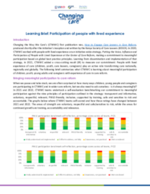
Background Information
My background is in social work. I have a Bachelor's in social work and a master's in children's issues and international development. I have completed courses in child protection. I have worked for community organizations, children's organizations, in early childhood education services in communities. I worked with a government probation department with youth and adult cases coming out of court, and later with a street-connected children's program. I have experience in reintegration of children and case management.
Membership & Associations
Our Interview With Practitioner
To further my skills there are a lot of things that I do. The first is attending seminars and taking up new and different opportunities whenever I can. There are always avenues to learn more if we are open to them. I like to engage with new people and to hear how they do their work. I read a lot too.
I have learned that it is important to have a heart and to care, important to bring commitment to your work and to recognize that you are making a difference even though the work might seem hard. With out these two things, working as a social worker might be impossible.
The people who have experience in this work - they are our biggest resource! Another useful resource is platforms and other ways of understanding work in other contexts and countries - so opportunities to come together, exchanges, conferences and networking. These are not very concrete "tools" but I think they are the most important tools we have in our world.
The reason I do this work is that I care about children - it might sound cliché, but I care about working to ensure that we do not repeat the suffering that we see around our communities. I want life to be easier for children and I believe we can all do our part.
One approach that I see as important is not seeing the family in isolation - just like not seeing only the child. Speaking from experience, we have to see the family, and the child and the youth - all together- we always have to look at the experience and to see who they have around them - what is their situation and how could support and help come around that specific situation.
Where They Operate
Key Areas of Work
Languages Spoken
Practitioner Resources
This learning brief was developed as part of the CTWWC 2022 annual report and shares learning from Kenya, Guatemala and Moldova. It is intended to help other practitioners understand how to bring meaningful participation of people with lived experience into care reform. By people with lived experience CTWWC considers children and youth, care leavers, parents and other care givers who are experiencing the care system in their context.

